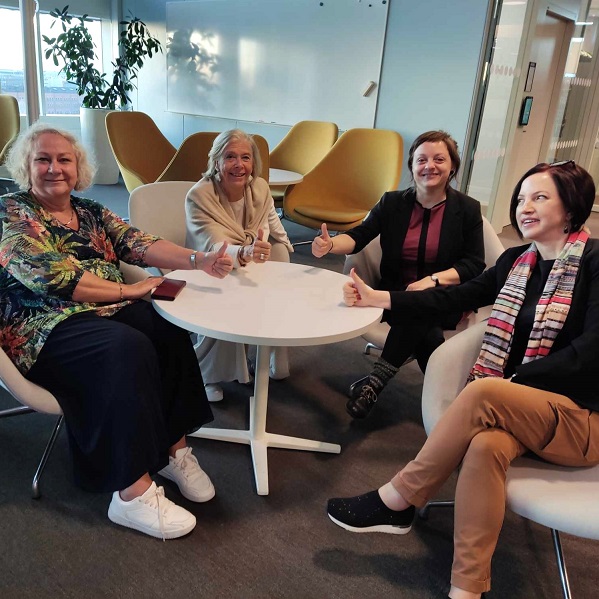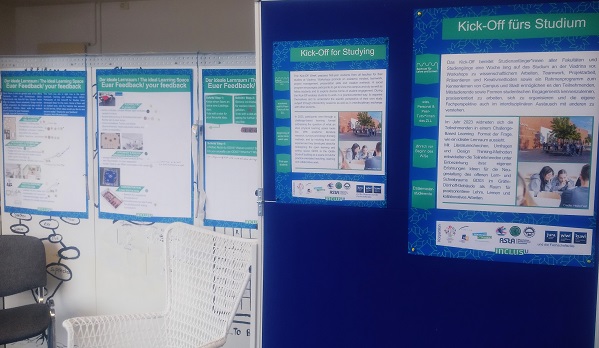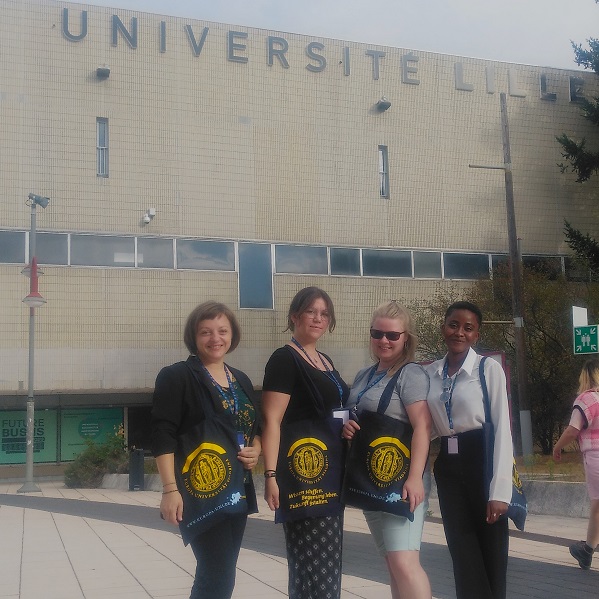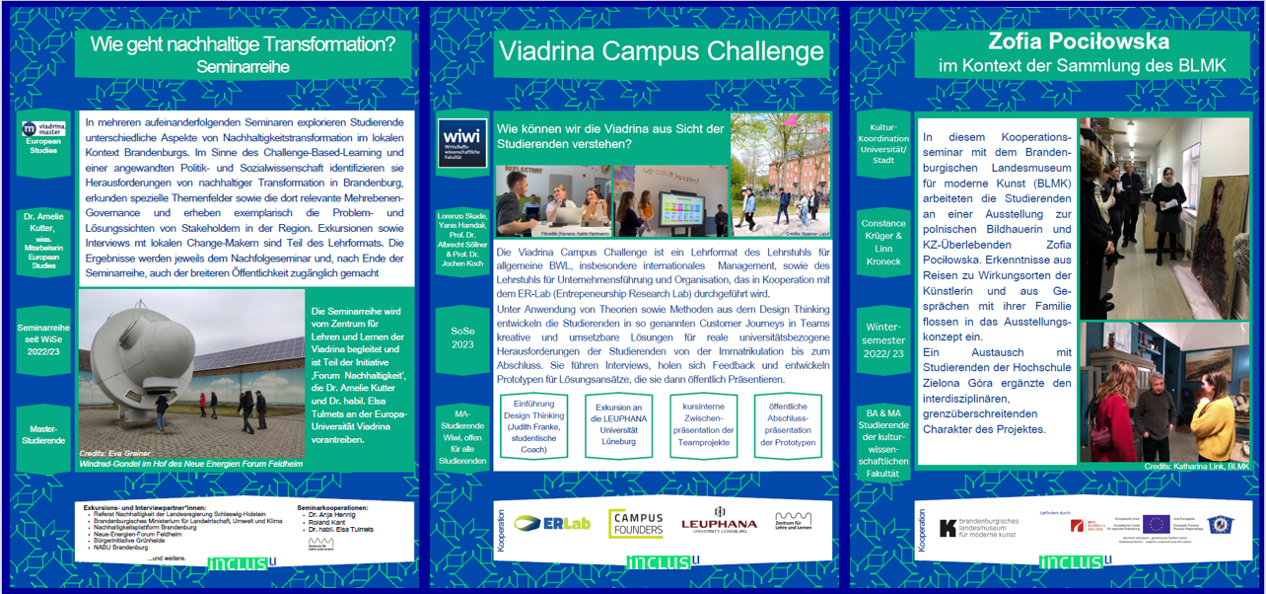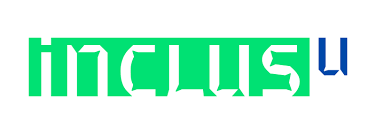Challenge-Based Learning
Challenge-Based Learning
In line with the guiding principles for teaching and Viadrina's self-image as a teaching institution that is committed to the ideal of good teaching and promotes innovation - also in teaching - we understand Challenge-Based Learning (CBL) as a didactically sound teaching approach that tests scientific questions and methods on (complex) real social challenges, usually in cooperation with non-university partners, involves different disciplines and perspectives and actively incorporates the individual experiences of students.
Challenge-based learning thus emphasises the relevance of the course content and enables students to connect with it individually, contributes to the unity of research and teaching, promotes scientific thinking and critical reflection in science, business and society, allows disciplinary boundaries to be experienced, encourages reflection and opens up perspectives, trains students to deal with complex contexts in a rapidly changing reality and requires collaborative work: of students, lecturers and with non-university partners, closely links subject content and working methods with interdisciplinary competences and also prepares students for professional tasks.
In the spirit of education for sustainable development, CBL aims to enable students to make judgements and to think and act in a sustainable way.
Short film of the workshop at the University of Lille in September 2022
Impressions from the CBL work
Clarification of terms and didactic discourse
Methodologically, CBL is divided into three steps:
- Involvement or introduction
In the introduction, the learners define a major topic. This is supplemented by a challenge or a call to action.
- Investigate
Investigating involves learners formulating further key questions, sifting through resources and gathering knowledge to better understand the topic and develop possible solutions.
- Implementation
During implementation, they develop possible solutions, test them (e.g. using prototypes) and ask new questions. Finally, they apply their ideas, evaluate them and present the results.
The participants continuously document, share and reflect on their learning and research process.
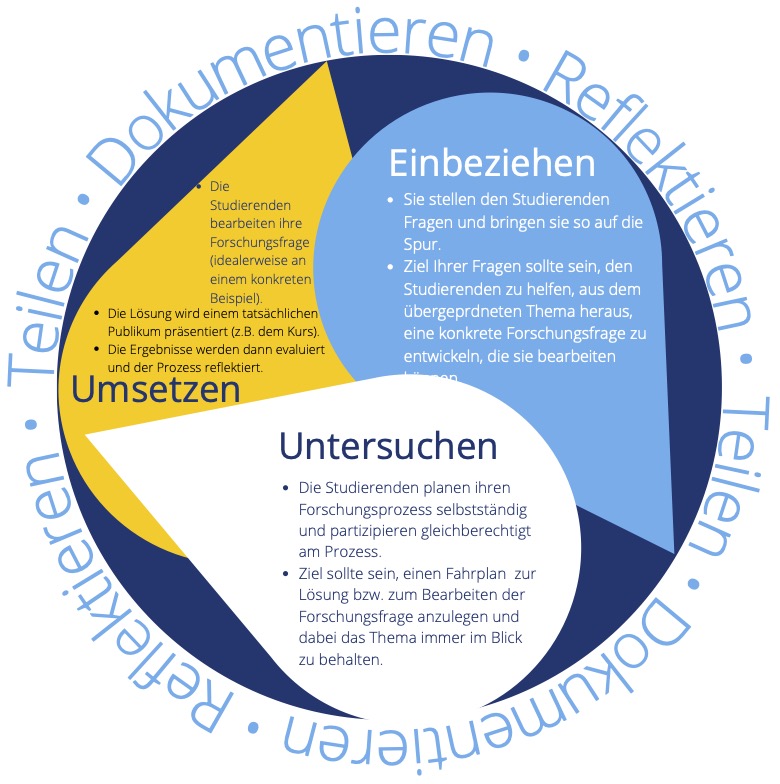
In 2008, Apple presented a concept for high schools under the term Challenge-Based Learning, which followed a ten-year research project with schools, universities and other research institutions. Apple presents CBL as follows:
“Challenge Based Learning is an engaging multidisciplinary approach to teaching and learning that encourages students to leverage the technology they use in their daily lives to solve real-world problems. Challenge Based Learning is collaborative and hands-on, asking students to work with peers, teachers, and experts in their communities and around the world to ask good questions, develop deeper subject area knowledge, accept and solve challenges, take action, and share their experience.” (Nichols, Cator, Torres 2016).
In recent years, this teaching approach has also spread under the same term CBL in the university context, particularly in engineering (Ruijten-Dodoiu 2022; Leijon, Gudmundsson et al. 2022). Based on learning theory and in some cases explicitly differentiated from the original technological/entrepreneurial context of Apple, it is also increasingly being used in other disciplines, not least through funding measures as part of the European Universities Initiative of the European Commission (Craciun, Kaiser et al. 2023). This still refers to a multidisciplinary approach that encourages students "to work actively with peers, teachers and stakeholders in society to identify complex challenges, formulate relevant questions and take action for sustainable development”. (Rådberg, Lundqvist et al. 2020).
- Christersson, C. E.; Melin, M.; Widén, P.; Ekelund, N.; Christensen; J., Lundegren, N.; Staaf, P. (2022). Challenge-Based Learning in Higher Education: A Malmö University Position Paper. International Journal of Innovative Teaching and Learning in Higher Education (IJITLHE), 3(1), 1-14.
- Craciun, D.; Kaiser, F.; Kottmann, A.; Van der Meulen, B. (2023). Research for CULT Committee –The European Universities Initiative, first lessons, main challenges and perspectives, European Parliament, Policy Department for Structural and Cohesion Policies, Brussels
- Cruger, K. M. (2017). Applying challenge-based learning in the (feminist) communication classroom: Positioning students as knowledgeable change agents. Communication Teacher, 32(2), 87-101.
- Gallagher, S. E.; Savage, T. (2020): Challenge-based learning in higher education: an exploratory literature review, Teaching in Higher Education, DOI:10.1080/13562517.2020.1863354.
- Leijon, M.; Gudmundsson, P.; Staaf, P.; Christersson, C. (2022). Challenge based learning in higher education–A systematic literature review. Innovations in Education and Teaching International, 59(5), 609-618.
- Nichols, M.; Cator, K.; Torres, M. (2016). Challenge Based Learner User Guide. Redwood City, CA: Digital Promise.
- Rådberg, K.; Lundqvist, U.; Malmqvist, J.; Svensson, O.l (2020). From CDIO to challenge-based learning experiences – expanding student learning as well as societal impact? .
- Ruijten-Dodoiu, P. (2022). Vision for Challenge Based Learning. In: Stang/ Becker (ed.). Learning World University 2030. de Gruyter, 79-89.
- van den Beemt, A.; van de Watering, G.; Bots, M. (2022). Conceptualising variety in challenge-based learning in higher education: the CBL-compass. European Journal of Engineering Education, 1-18.
- Manual: Servalli, A. (2021). Weaving knowledge together. Articulating and assessing the involvement of societal actors in challenge based learning within design education. Malmö University. (PDF)
CBL has overlaps with experience-based, problem-based, research-based learning and is usually carried out as project-orientated teaching. We consider CBL to be characterised by its fundamental focus on larger complex and open-ended social challenges and the learning process as an open-ended contribution to a (partial) solution. The process is more important than the result, teachers primarily take on an accompanying role and support joint interdisciplinary research through access to knowledge and resources.
CBL concrete
Project & Network
The Viadrina is a member of the InclusU network. Under the leadership of the University of Malmö, partner universities in Lille and Mykolas Romeris (Vilnius) are working together with the Viadrina on CBL, gathering local experiences and practical examples, developing approaches for the respective institution and developing them further. The activities are funded by the DAAD, for example:
- December 2021 - Online workshop for teachers
- May 2022 - Workshop at the European University Viadrina with teachers
- September 2022 - Workshop at the University of Lille with teachers and students
- March 2023 - "Challenge Based Learning for global understanding" - Session at the online conference Intercultural Learning for Global Understanding of the International Network of Universities (INU)
- 16-18 October 2023 - Workshop at the University of Malmö with lecturers, students and external partners
For the Viadrina, the Center for Teaching and Learning coordinates the content of the network's activities in the field of Challenge-Based Learning, in cooperation with the Viadrina International Affairs department.
Teaching at the Viadrina - examples
Almost all faculties and departments at Viadrina already work with teaching approaches that fulfil the criteria for challenge-based learning in various forms, even if they are not always named as such. The following is a selection of examples:
- Viadrina Law Clinic (Law & various partners)
- Viadrina Campus Challenge(Wiwi & various partners/ ER-Lab)
- Environment and Digital (Kuwi & Paris 1 Panthéon-Sorbonne, Centre Marc Bloch)
- MA of Digital Entrepeneurship (MoDE) (ENS & various companies)
- ViAPACS (IKM & various partners)
- Applied Economics: Becoming Fluent in Data (Wiwi & various partners)
- How sustainable is the European Union locally? Sustainability transformation projects in Brandenburg (Kuwi & local actors)
- Team and project management (ZLL)
- Moot Courts (Jura & various partners)
- "Looking" - Critical perspectives on the globalised world (Wiwi & various partners)
- Art and gentrification. A research seminar in cooperation with the project "Reality - On the attempt to overcome gentrification" of the KW Institute for Contemporary Art (Kuwi & Kunstwerke Berlin, UdK, Haus der Statistik)
- Learning organisation: The Viadrina as a real laboratory (ZLL & City / Caritas Volunteer Centre)
- MA Mediation and Conflict Management (Jura/ IKM & various partners)
- We didn't have anything and we still shared that bit - Creativity and Entrepreneurship (Wiwi & regional start-ups)
- Social living conditions in rural areas in Brandenburg (Kuwi & Kommune in Brandenburg)
- Kick-off for studies (ZLL / ZSB / Viadrina Sprachen GmbH & city)
At the Teaching Day in May 2022, the Viadrina Module concept was discussed as a draft for anchoring project-oriented teaching at the Viadrina.
Existing ZLL training courses on Challenge-Based Learning
20 December 2022, 14-17:00 - Workshop "Basics of Challenge-Based Learning" in the Ukraine digital project (Niki Kasis & Elena Schmid)
24 January 2023, short input CBL in the PROKODIL project (Niki Kasis)
23 May 2023, 14-17:00 - Workshop "Basics of Challenge-Based Learning" in the Ukraine digital project (Niki Kasis & Elena Schmid)
Information on
Education for Sustainable Development (ESD)
The Viadrina is involved in the working group „Sustainability at Brandenburg Universities“, which deals with the state-wide implementation of higher education for sustainable development (HBNE). Anchoring HBNE in the university-relevant framework documents and curricula is of central importance in order to realise sustainability in teaching. The 2023 working group has published a handout on this topic: „Zukunftsfähige Curricula gestalten – Eine Handreichung zur curricularen Verankerung von Hochschulbildung für nachhaltigen Entwicklung“ Challenge-Based Learning erfüllt die Empfehlungen.
If you as a lecturer or student at Viadrina are interested in Challenge-Based Learning and would like to exchange ideas and network, please contact us at zll@europa-uni.de or kasis@europa-uni.de.
If you organise CBL seminars yourself or have taken part in a CBL seminar at the Viadrina that is not listed here, we would be pleased if you would inform us about it and tell us the title, faculty/department and teacher of the event.
